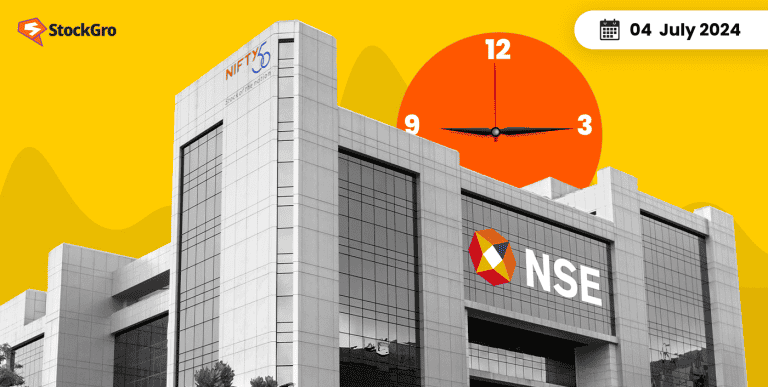
As per the latest regulatory development by SEBI, the Indian stockbroking industry will be experiencing a period of remarkable transformation. Stock exchanges, depositories, and clearing houses (known as MIIs or market infrastructure institutions) have been directed to levy the same transaction fees from brokers irrespective of business volume.
There was widespread panic in the stockbroking industry, and some companies lost share values by up to 11% on the back of the news. Let’s find out what SEBI’s new directive is and how it will impact MIIs and investors.
Who are Market Infrastructure Institutions (MIIs)?
MIIs (Market Infrastructure Institutions) are the organisations that are responsible for the smooth running of the stock market as they render crucial services.
MIIs include:
Stock exchanges: Through stock exchanges like BSE and NSE – people can buy and sell `securities. In simple terms, stock exchanges act as middlemen.
Clearing corporations: Companies that assure settlement of trades and guarantee the delivery of securities along with payment for them.
Depositories: Organisations that keep the securities digitised, like CDSL and NSDL; therefore, avoiding the usage of physical papers.
These organisations earn by charging fees for their services. These fees are usually linked to the trading volume on the exchange or the value of securities deposited.
Also read: Bajaj Auto’s sales surge: A 5% leap in June 2024
Details of SEBI’s directive
On July 1, 2024 – SEBI published a circular that stated that charges imposed by market infrastructure institutions like stock exchanges, clearing corporations, and depositories should not be linked to the trading volumes and should be standardised.
Exchanges usually adhere to a practice of charging lower fees to stock market brokers if the latter can get a high turnover, which is a major reason for growth in segmental trading such as derivatives.
Right now some market service providers (MIIs) have a system where their fees change depending on how much trading (volume) happens. These fees get passed on to you, the investor, every day by your stock market broker. The MIIs collect fees from these middlemen, but only once a month.
Thus, the possibility of a situation arising in which the charges collected from end clients are more than the amount paid to the MIIs, which in turn leads to a breach of transparency, a scenario called a mismatch, becomes evident.
To avoid this, SEBI made it mandatory for the charges to be uniform, irrespective of the volume of trade and business. This will ensure transparency of the securities market.
SEBI also said that all members, big or small, should be charged the same fees by the market folks (MIIs). This gets rid of the old system where fees depended on how much a stock market broker was trading. The idea here is to make things fairer for everyone.
Before, the fee structure kind of rewarded stock market brokers in India, who did a lot of trades. SEBI felt this wasn’t fair because everyone, big or small investors, should have the same chance to play in the market.
This change (starting from October 2024) will shake things up for the MIIs, who might have to adjust how they charge their fees, especially for their bigger clients. SEBI wants them to figure out a new system that is fair and transparent and ideally, even cheaper for you, the investor!
Immediate market reaction
Why IIFL share price is falling, and why Angel One share price is falling? Because of the SEBI directive.
Engaging in response, brokerage stocks like:
- IIFL Securities,
- Angel One,
- SMC Global,
- 5Paisa Capital,
- Motilal Oswal Financial Services and
- Geojit Financial Services
Were among the biggest decliners in the range of 2–11% at the start of trade on July 2 2024.
Angel One share price felt the highest at 10.50% to hit a daily intraday low of ₹2,307.95 each. IIFL share price closely followed with a fall of 7.44%. The share went to a low of ₹195.20 per share in the intraday session.
Motilal Oswal’s share price was also down by 2.81%. Other shares like:
- 5Paisa – was down 4.5%
- SMC Global – was down 2.4% and
- Geojit Financial Services was down at 2.8%
Must read: Paytm’s entry into healthcare with ‘Health Saathi’
Implications on MIIs
Market infrastructure institutions (MIIs) might adjust their pricing based on the new rules. But if they keep things similar to how they are now, their earnings should not change much.
Discount brokers (the ones with low fees) might be hurt the most. This is because a big chunk of their income comes from these transaction charge discounts. They have a lot of customers who trade smaller amounts, so these discounts add up. For example, Angel One made approx ₹400 crores from these charges last year.
Discount brokers typically get between 15% and 30% of their revenue from these discounts. For some cheap brokers, that number can be even higher, like 50% to 70%.
However, some brokers believe they can make up for this loss by charging you, the investor, slightly more in brokerage fees.
How do investors benefit?
This change could mean lower fees for you! Right now some brokers might keep the savings they get from transaction discounts instead of passing them on to you. With a flat fee structure, that is less likely to happen.
In the long run, this could lead to a significant drop in your trading costs. This could make investing more affordable and accessible for everyone.
Finally, this change might make brokers compete more on things that matter to you, like the quality of service and their overall pricing, instead of just focusing on getting volume discounts.
You may also like: Quant mutual fund: SEBI’s investigation reveals front-running suspicions
Conclusion
Uniform fees for the MII – directive issued by SEBI is significant for the Indian stock market. However, it is observed that the concerns of the broking firms dominate the immediate market reaction, while the long-term effects could be beneficial for investors and the overall market ecosystem.
Moreover, the increased transparency, a level playing field, and potential cost reductions could be the channel of inclusion and efficiency that the sector has longed for. In addition, constant vigilance and other regulatory action may become essential to guarantee that the positive implications of this directive come to pass.
